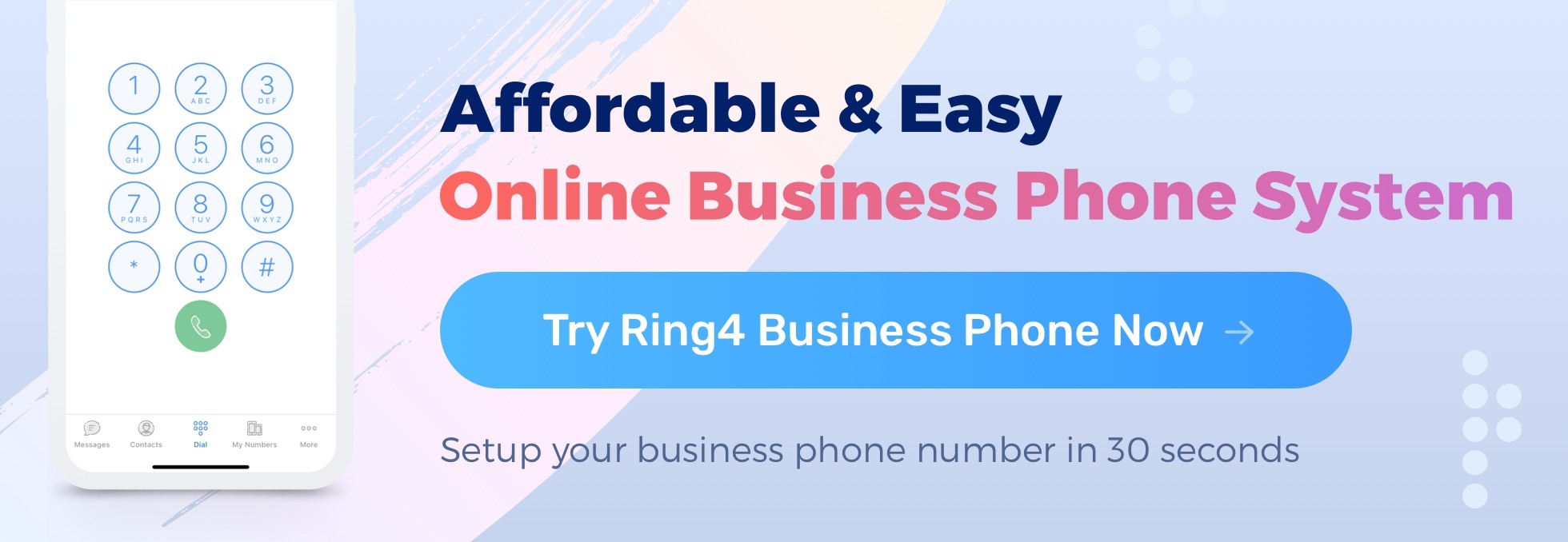Want to learn about Voice over Internet Protocol (VoIP) for insurance companies? You’re in the right place! VoIP is a powerful and cost-effective technology that has revolutionized the way companies in the insurance industry communicate with their customers and other departments.
Thanks to VoIP, insurance companies can now stay connected with their customers in real time, regardless of their geographic location while still providing an excellent customer experience. It also allows them to quickly exchange information between departments, helping them make better decisions faster.
In this post, we’ll explore the top 10 uses of VoIP for insurance companies. Let’s dive in!
1.
VoIP systems can help insurance companies establish better customer service experiences through fast and reliable communication.
Gone are the days of static-filled calls and limited connectivity. With VoIP, insurance agents can seamlessly connect with customers in real time, regardless of their location. Whether it's addressing inquiries, providing updates on policies, or offering personalized assistance, VoIP ensures that communication is efficient and effective.
By leveraging the power of the internet, VoIP systems deliver crystal-clear voice calls and video conferences, fostering a sense of trust and reliability between agents and customers. With this technology, insurance companies can provide exceptional customer service, building strong relationships and gaining a competitive edge in the industry.
2.
VoIP systems can provide cost savings compared to traditional landline phone systems.
Unlike landline systems that require expensive hardware and infrastructure, VoIP phones for insurance companies operate over the internet, eliminating the need for dedicated phone lines and costly maintenance.
With VoIP, insurance companies can significantly reduce their monthly communication expenses, especially for long-distance or international calls, as they are transmitted as data packets over the internet. Additionally, VoIP systems often come bundled with a variety of features and services, such as voicemail, call forwarding, and conference calling, which would require additional fees or equipment with landline systems. As a bonus, by leveraging the cost-effective nature of VoIP, insurance companies can allocate their resources more efficiently, invest in other areas of their business, and ultimately improve their bottom line.
3.
VoIP systems can offer a range of features including call recording, data security, and clearer communication regardless of weather or geographic location.
One key feature is call recording, which allows companies to capture and store important customer conversations for reference, training, or compliance purposes. This valuable tool enables agents to revisit discussions, ensuring accurate information and maintaining high-quality service.
VoIP systems also prioritize data security, implementing robust encryption protocols to protect sensitive customer information during calls and data transmissions. This ensures that insurance companies can maintain confidentiality and comply with privacy regulations.
Additionally, VoIP systems offer superior call quality regardless of weather conditions or geographic location. By leveraging the internet for communication, VoIP bypasses the limitations of traditional phone systems, ensuring clear and uninterrupted conversations even in adverse weather conditions or remote locations. This level of reliability and clarity contributes to a seamless customer experience, fostering trust and satisfaction. With these advanced features, VoIP empowers insurance companies to enhance their communication capabilities, strengthen security measures, and deliver exceptional service to their valued customers.
4.
VoIP systems can provide better call clarity due to the more reliable internet cables used to transmit voice data.
Traditional landlines can be susceptible to interference or degradation in call quality. VoIP on the other hand leverages robust and dedicated internet infrastructure for voice transmission. Internet cables are designed to handle large volumes of data, ensuring a stable and consistent connection for voice communication.
As a result, VoIP calls are characterized by clear and crisp audio, free from the static, echoes, or disruptions often associated with traditional phone lines. This enhanced call clarity significantly improves the overall communication experience for insurance companies, enabling agents and customers to engage in conversations with greater ease and understanding.
Whether it's discussing policy details, filing claims, or addressing inquiries, the reliability and clarity of VoIP systems contribute to efficient and effective communication, ultimately enhancing customer satisfaction and streamlining insurance operations.
5.
VoIP systems can enable remote working, allowing insurance agents to access customer data from any location with an internet connection.
With VoIP, agents can handle customer inquiries, process policy applications, and provide assistance regardless of their physical location. Through secure internet connections, agents can log into the VoIP system and access customer databases, policy information, and communication tools, ensuring they have all the necessary resources at their fingertips.
This flexibility not only increases productivity but also enhances customer service by allowing agents to respond promptly to client needs, regardless of their time zone or geographic location. Whether working from home, on the road, or at a remote branch office, VoIP empowers insurance agents to stay connected and efficiently serve customers while enjoying the benefits of remote working.
6.
VoIP systems can provide scalability, allowing insurance companies to increase or decrease their phone system capacity as needed.
Whether experiencing periods of rapid growth or downsizing, VoIP provides the flexibility to scale the phone system accordingly. Unlike traditional landline systems that require physical infrastructure changes, VoIP operates in a virtual environment, making it much simpler to add or remove phone lines as required.
Insurance companies can effortlessly increase capacity during peak seasons to handle high call volumes, ensuring that customer service remains uninterrupted. Similarly, during slower periods or organizational changes, the phone system can be easily downsized to optimize resource allocation and reduce costs. With VoIP, insurance companies can adapt their communication infrastructure to align with their business needs, facilitating agility and efficiency in their operations.
7.
VoIP systems offer enhanced mobility, allowing insurance agents to take their office phones with them wherever they go.
VoIP phones for insurance companies eliminate this constraint by enabling agents to use softphone applications installed on their laptops, smartphones, or tablets. These applications replicate the functionality of their office phones, allowing agents to make and receive calls, access voicemail, and utilize other communication features while away from their desks. This mobility empowers agents to stay connected with clients and colleagues, even when they are attending meetings, visiting clients, or working remotely.
By having their office phone accessible on their mobile devices, insurance agents can maintain professional communication, ensuring seamless customer service regardless of their location. The enhanced mobility offered by VoIP systems increases productivity, responsiveness, and ultimately contributes to a more agile and customer-centric insurance operation.
8.
VoIP systems can offer advanced features such as call forwarding, virtual numbers, extensions, and voicemail.
VoIP systems offer a plethora of advanced features that enhance the communication capabilities of insurance companies. One such feature is call forwarding, which allows calls to be seamlessly routed to alternative numbers or devices, ensuring that important calls are never missed. This flexibility enables agents to stay connected even when they are away from their desks or out of the office.
Additionally, VoIP systems support virtual numbers, which can be obtained from different geographical locations. This enables insurance companies to establish a local presence in multiple regions, making it convenient for clients to reach them without incurring long-distance charges. Extensions are another valuable feature of VoIP, allowing companies to assign unique numbers to different departments or employees, streamlining internal communication and facilitating efficient call transfers.
Lastly, VoIP systems provide voicemail functionality, enabling clients to leave messages when agents are unavailable. These voicemails can be accessed remotely, ensuring that no important messages are missed.
9.
VoIP systems provide improved security for calls, as all communication is encrypted.
VoIP systems offer enhanced security for calls by employing robust encryption protocols to protect all communication. Unlike traditional phone systems where conversations can be vulnerable to interception or unauthorized access, VoIP systems encrypt voice data packets, ensuring that they remain secure and confidential during transmission. This encryption safeguards sensitive customer information, ensuring compliance with data protection regulations and maintaining the trust of clients.
By leveraging encryption technologies, insurance companies can mitigate the risk of eavesdropping or data breaches, providing a secure environment for discussing policy details, processing claims, and handling confidential customer information. The implementation of encryption in VoIP systems adds an extra layer of protection, giving insurance companies and their clients peace of mind knowing that their conversations are safeguarded against unauthorized access.
10.
VoIP systems can be integrated with other software applications such as CRM systems, allowing insurance companies to better manage customer data.
By integrating VoIP with CRM systems, insurance agents can access and update customer information in real-time, providing a comprehensive view of each client's history, policies, and interactions. This integration streamlines the workflow by eliminating the need for manual data entry or switching between different platforms. Agents can make calls directly from the CRM system, automatically logging call details and notes, ensuring accurate and up-to-date records. CRM integrations enhance efficiency, improves customer service, and enables agents to provide personalized and informed assistance. Additionally, the integration of VoIP with CRM systems enables advanced analytics and reporting capabilities, allowing insurance companies to gain insights into customer behaviors, trends, and preferences.
Bottom Line - Smart Businesses Opt for VOIP Phones for Insurance Companies Over Traditional Phones
VoIP technology has been a great asset to the insurance industry. It allows companies to quickly and reliably contact customers and keep their lines of communication open at all times. With its superior sound quality, comprehensive features, and easy integration with existing software solutions, VoIP provides an effective and cost-efficient way for insurance companies to stay connected and stay competitive. By utilizing VoIP solutions, insurers can improve customer service, enhance productivity, and gain a competitive advantage in the market.
Want to try VoIP phones for your insurance company? Click here to try Ring4’s mobile VoIP app for free!

